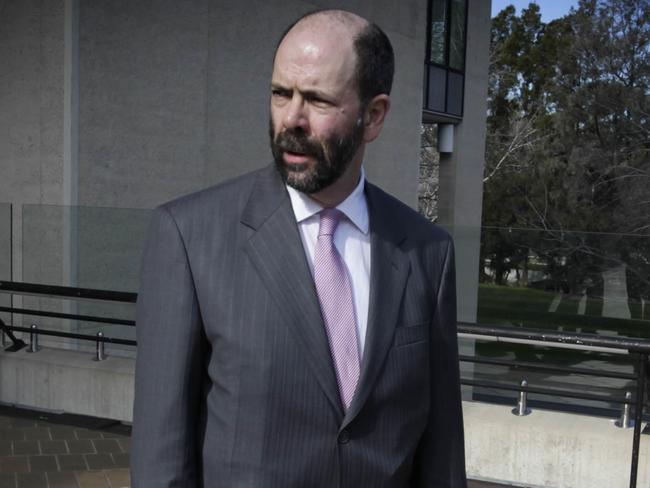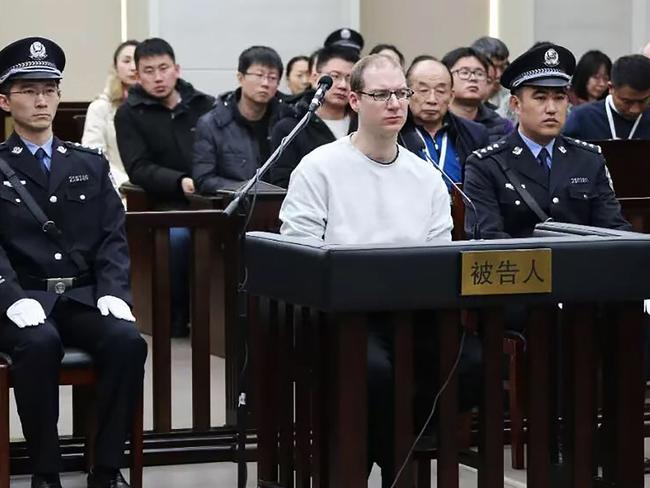Karm Gilespie: Aussie actor in touch with Australian officials as Chinese lawyer revealed
The Australian actor facing the death penalty in China for drug smuggling has received “very important” consular assistance as News Corp reveals details of the Chinese lawyer acting for him.
Crime in Focus
Don't miss out on the headlines from Crime in Focus. Followed categories will be added to My News.
A man sentenced to death in China for drug smuggling seven years after his arrest has spoken with Australian consular officials.
Foreign Minister Marise Payne confirmed the interaction, which provided Karm Gilespie, 53, with consular assistance.
Gilespie was arrested in 2013 with more than 7.5 kilograms of methamphetamine in his check-in luggage to board an international flight from Baiyun Airport, in the southern Chinese city of Guangzhou.
Gilespie has 10 days to appeal the death penalty.
“We were able to make a visit to the detention centre today and to engage in a video conference to have that visit,” she told Seven News on Tuesday after delivering a sharp speech on disinformation being spread by countries such as China.
“That is a very important thing and I’m very pleased that has been conveyed back to his family.”

Ms Payne said she would continue to seek consular access and reiterated Australia rejects the application of the death penalty in all countries, in all circumstances.
“I’m very careful and very considered about his situation,” she said.
Her comments follow Prime Minister Scott Morrison stating Australian officials had raised Gilespie’s case with Chinese counterparts multiple times and were working to secure his freedom.
His family have asked friends not to speculate on his case.
“Our family is very saddened by the situation,” his family said in a statement on Monday.
“We also request that friends and acquaintances of Karm refrain from speculating on his current circumstances, which we do not believe assists his case.”
Ms Payne’s comments also follow News Corp Australia being able to reveal the Chinese lawyer acting for Australian man Karm Gilespie has over 20 years of experience dealing with foreign clients and took over the former actor’s case in 2014.

Zou Jianhong, from Guangzhou Hongmian Law firm, did not want to comment on the case but told News Corp he had extensive experience in foreign-related legal services and often dealt with foreign embassies and consulates in China.
The information follows China unleashing another scathing attack on Australia and labelled its mentality as “increasingly irrational” for defending the Victorian man, who has been sentenced to death for drug-smuggling offences.
Earlier, government-run media outlet The Global Times reported the verdict of Mr Gilespie was “just” and “fair” after being detained at the Baiyun Airport in Guangzhou with 7.5 kilograms of methamphetamine in his checked-in luggage in 2013.
Mr Gilespie, who starred on police drama series Blue Heelers and The Man from Snowy River, and was given just 10 days to appeal the verdict, was sentenced to death in the Guangzhou Intermediate People’s Court on June 10.
“The verdict for Gilespie is a just, fair ruling in strict accordance with its laws. Since the beginning of the 21st century, a few foreign drug smugglers have been sentenced to death in China, including those from Japan, Britain and Canada,” The Global Times reported.
“Drug smuggling is a felony that should be dealt with harshly. Many Asian countries, including Singapore, Indonesia and China mandate the death penalty for drug crimes.
“Australia has abolished capital punishment, but it makes no sense if Australia keeps using its own legal standards to criticise China’s ruling. Chinese society as a whole has zero tolerance for drug trafficking.”
The article then went on to warn “bilateral relations may further deteriorate” as a result of Australia condemning the death penalty and providing “consular assistance and make representations on behalf of Gilespie”.
“Australia’s mentality toward China has become increasingly irrational. It has chosen to act as a pawn of the US in confronting China, but it doesn’t want to face the consequences,” the article read.
“Canberra has repeatedly harmed China’s interests unilaterally, however, as China took action to safeguard its legitimate rights and interests, Australia has played the victim, calling China’s counteractions ‘bullying’ or ‘coercion’.”
The editorial, published on Sunday, comes as tensions rise between the Chinese and Australian governments.
DETAILS OF KARM GILESPIE’S DEATH SENTENCE
Fifty-six year old former actor Karm Gilespie could have just days to file an appeal after a Chinese court sentenced him to death for drug smuggling on June 10.
Although Mr Gilespie has been imprisoned for the past seven years, the sentencing could not come at a worse time, with relations between Beijing and Canberra strained by tensions over trade and the coronavirus outbreak.
This is what happens next, and what Mr Gilespie’s chances of escaping the death sentence are.
WHAT HAS HAPPENED?
Mr Gilespie was detained while attempting to board an international flight from Baiyun Airport in Guangzhou in 2013. Authorities alleged he was attempting to smuggle more than 7.5 kilograms of methamphetamine in his checked-in luggage.
Mr Gilespie was sentenced to death in the Guangzhou Intermediate People’s Court on June 10. The court also ordered all of his personal property be confiscated.
WHAT HAPPENS NEXT?
Mr Gilespie was given just 10 days to appeal the verdict, but it is unclear whether that means he will need to lodge an appeal by June 20 – this Saturday – or whether the 10 days referred only to work days.
It is believed that an appeal in his case will be made to the Guangdong Provincial High Court.
Law Professor Don Rothwell from Australian National University said it was unclear what level of legal representation Mr Gilespie had to date.

“DFAT does not provide legal advice to Australian citizens detained overseas, but they do facilitate connections between Australians detained overseas, including in China, and local lawyers,” Prof Rothwell said.
A Chinese legal source who spoke to News Corp on condition of anonymity said that a high court will overturn an intermediate court verdict only in very rare cases – and even rarer when a death sentence has been issued.
“The rate of overturning is almost neglectable, even no statistics,” the source said.
IS AN APPEAL THE ONLY OPTION?
Although Mr Gilespie has only one Ave of appeal, he could still apply for a review of his case, which could be presented to either the Guangzhou Intermediate People’s Court or the Guangdong Provincial High Court. The Chinese legal source said the review application should be presented on the basis of strong, subverting new evidence, but the review application may not affect the sentence.
Although is not known how long the entire process could take, Associate Professor Colin Howes, expert in Chinese law at Sydney’s University of Technology, said Mr Gilespie’s status as a foreigner could draw the case out longer.
“Because of the international attention, the courts are going to take more precautions to make sure they look at the evidence more thoroughly, unless they feel it’s a completely clear cut case,” he told News Corp.
“A lot depends on the circumstances and we don’t really know what happened when (Mr Gilespie) was arrested and what the circumstances were. In death sentence cases they don’t publish the trial judgments because it’s considered to be a state secret, so it’s very difficult to know what the evidence was.”

But the case of Canadian citizen Robert Schellenberg, who appealed a death sentence drug conviction in China last year, could be instructive for Mr Gilespie’s case, Assoc Prof Hawes said.
“He had an appeal, but they’re still waiting for the result, and that was last May. They haven’t come out with a judgment yet so it could be at least a year before the whole thing is decided,” he said.
Amnesty International campaigner Rose Kulak said there were records of some people sentenced to death in China whose sentences were later changed because of good behaviour, although these were rare.
CHINA AND THE DEATH PENALTY
Beijing’s Supreme Court in Beijing has the final approval on any death sentence.
The execution would most likely be carried out via lethal injection, with only Mr Gilespie’s family notified of the date. The Australian embassy would also be notified.
“We know that China is the highest executioner in the world, year upon year,” Ms Kulak said. “In terms of the actual numbers, we don’t know. China considers it a state secret. But we know it is in the thousands.”

It is also not known how many people China executes over drug offences, but on June 26 last year, the UN’s official day against drug abuse and illicit trafficking, one Chinese province marked the day with 82 drug judgments, including some death sentences, Ms Kulak said.
“It was something that on that day they clearly took pride in,” she said.
While China’s use of the death penalty was against the global trend, the number of offences it was being applied to had been decreasing over the past few years, she added.
WILL PROTEST MAKE A DIFFERENCE?
The Beijing legal source said lawyers in China were heavily suppressed, and many are afraid to be named. In 2016, over 300 lawyers and human rights activists were arrested.
Prof Rothwell said it was important for Australia to show due respect for the Chinese legal system by allowing the appeals process to run its course.
“I would think that Australia would be keen that the appeals process is not accelerated,” he said. “An accelerated appeals process would certainly suggest some level of political interference by the Chinese side and if the appeals process was to play out in the normal course of events this matter may not be resolved until 2021, or even beyond that, at which point the tensions in the Australia/China relationship may have subsided a little bit, which may be advantageous for Gilespie,” Prof Rothwell said.
WHAT ABOUT BRIBERY?
Although it has long been suggested that secret deals have enabled Australians to escape drug convictions in other parts of Asia, Prof Rothwell stressed that those cases were in countries where Australia enjoyed a stronger bilateral relationship, and could exert more diplomatic “leverage”.
“None of those factors to my mind are really present vis-a-vis the Australia/China relationship,” he said. “So that would not be an option.”

Assoc Prof Howes said corruption in Chinese courts was “less likely to happen that it used to be”.
“There have been quite a few situations where prosecutors have been found guilty of corruption including accepting bribes for giving people lighter sentences or even not prosecuting at all,” he said.
“The problem (for Mr Gilespie is) he’s already past that stage. He’s already had his sentence, so it’s going to be pretty much impossible to do anything like that. It would normally happen much earlier in the process.”
An anti-corruption drive within China over the past five years “has made prosecutors a lot more wary of engaging in that kind of corruption, because they might go to prison themselves,” Assoc Prof Howes said.
Ms Kulak noted there was another powerful disincentive for people in the court system to accept bribes.
“The death penalty in China also applies to corruption,” she said.
Originally published as Karm Gilespie: Aussie actor in touch with Australian officials as Chinese lawyer revealed
